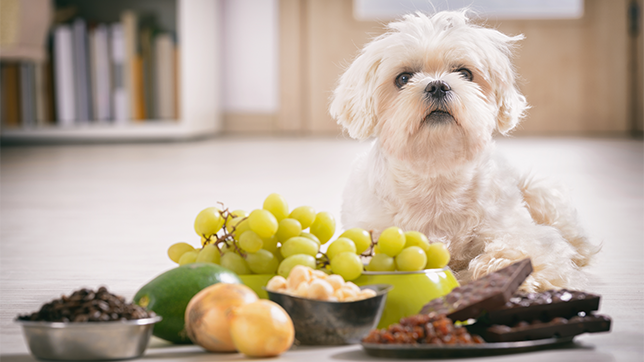23rd January 2019
Can pets have alcohol?
It might be tempting to give your dog or cat a few licks of your beer, or a taste of your wine, but alcohol can have a huge impact on our pets, whatever the dose. This can also happen with raw dough – when an animal eats it the active yeast transforms into carbon dioxide and alcohol which causes the stomach to painfully expand and bloat.
So, alcohol and pets are a big no-no.
Can pets eat avocados?
We all love a bit of avocado on toast, but don’t give your dog or cat your leftovers! Avocados contain a substance called persin which can cause sickness and diarrhoea in our pets.
Not only that, if they manage to get a hold of a whole avocado then the seed can become stuck in their intestines or stomach which could prove to be fatal.
Can pets eat chocolate?
You might already know that chocolate can be fatal to our canine friends, but did you know it’s just as poisonous for cats, too? Chocolate contains something called theobromine which is toxic to our pets and their health can decline quickly after ingestion.
Can pets have coffee and caffeine?
It’s quite easy to leave your breakfast brew lying about in the morning rush but it’s important you make sure it’s out of your pet’s reach as it can cause poisoning in most cats and dogs.
Can pets eat corn on the cob?
Unfortunately, corn on the cob doesn’t digest in your pet’s stomach, meaning that they are likely to cause a blockage. So, keep these away from any intrigued noses and hungry tummies as it could end disastrously.
Can pets eat fruit with seeds and pips?
Dogs and cats can eat most fruits including:
- Apples
- Bananas
- Blueberries
- Strawberries
- Watermelon
You will need to make sure to remove any seeds, sores or pips as these often contain chemicals that are toxic to our pets.

Can pets eat grapes and raisins?
This is a big no. Both grapes and raisins are bad for our pets and can be fatal. If your dog or cat managed to get their paws on some grapes, then they might start showing the following symptoms:
- Decreased appetite
- Lethargy
- Vomiting and diarrhea
- Tenderness in their abdomen
- Dehydration
- Increased thirst
These symptoms can all lead to kidney failure so it’s important to call the vets straight away if your pet has managed to eat some grapes or raisins.
Can pets eat Macadamia nuts?
Just like grapes and raisins, macadamia nuts should be kept out of reach of our feline and canine friends. They are indeed toxic to our pets.
Can pets eat onions and garlic?
You might be tempted to give some of your spaghetti Bolognese leftovers to your dog or cat but you might want to think twice before emptying it into their bowls. Giving onions and garlic to your pet can cause health problems, so it’s best to avoid sharing any dishes including these vegetables with your pet.
You will want to avoid:
- Onions
- Garlic
- Leek
- Chives
Can pets have xylitol?
Xylitol is a common sugar substitute and is fine for humans but is toxic to our pets. Xylitol is often found in sugar-free chewing gum, mouthwash, toothpaste and even in your favourite peanut butter.
Though your pet might never come across your minty gum and teeth washing necessities, but you might be unknowingly feeding them xylitol in their filled Kong. Please make sure you read the ingredients in your peanut butter to avoid any emergencies.
If you’re stuck for what human treats your pet can have then check out our blog on some DIY pet treats recipes.
Whilst we as owners can recognise which foods are dangerous to our pet’s health, unfortunately they don’t necessarily have that skill – and curiosity combined with a big appetite can result in unfortunate mistakes. Pet insurance can help you to cover the cost of veterinary treatment if your loved one gets injured or falls ill, helping you to provide security for your best friend when they need it most.
More on our dog blog
Read more news articles, opinion pieces, reviews and personal stories behind our dogs on our blog.
Need dog insurance?
Dog insurance can help cover the cost of veterinary treatment if your dog gets injured or falls ill.
